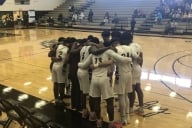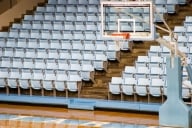You have /5 articles left.
Sign up for a free account or log in.
Another day, another drumbeat of higher ed news related to the coronavirus, spanning sports, politics and campus decision making.
The New England Small College Athletic Conference on Thursday announced the cancellation of the Division III league's winter sports season.
The league appears to be one of the first to take this step, with the National Collegiate Athletic Association going ahead with winter sports championships, if sometimes with reduced season lengths or tournament sizes.
The conference's decision comes as COVID-19 continues to wreak havoc on some college sports programs this fall. Just Thursday, Baylor University suspended all football activity, Appalachian State University canceled its second straight football game, and Boston College postponed five field hockey games because of a player's positive test.
The presidents of the New England league's members, which include 11 selective liberal arts colleges in Connecticut, Maine, Massachusetts and New York, said that changes in many of the institutions' academic calendars for the spring semester meant that many students would not return to their campuses until late January or early February, cutting deeply into the traditional season of intra-conference competition.
Middlebury College, for instance, announced today that it would hold its January term virtually and that students would return for the spring two weeks later than normal, in late February. Bowdoin College said this week that it would bring sophomores, juniors and seniors to campus for the spring term, also two weeks later than usual.
"We understand this decision will disappoint many of our students, given the important role athletics plays in the student experience," the statement read. "We remain committed to providing meaningful opportunities for our students to engage in athletic activities. Students may continue to participate in practice activities, strength and conditioning, skill development and leadership programming in accordance with NCAA, Conference and institutional policies, as well as state and local health guidelines."
The league also said that members "may schedule outside competition at their discretion." The NESCAC members are Amherst, Bates, Bowdoin, Colby, Connecticut, Hamilton, Middlebury, Trinity and Williams Colleges, and Tufts and Wesleyan Universities.
Wednesday, West Chester University of Pennsylvania went a step further, announcing that it would not play spring sports, either. The decision accompanied the university's announcement that it would continue remote instruction through the spring term.
"Exacerbated by spikes in many states and the onset of the seasonal flu, the latest scientific forecasts are predicting that the pandemic will continue to be unyielding through the winter and spring months," President Christopher Fiorentino said. "Continuing remote instruction through spring 2021 will ensure that WCU students will be able to earn credits for academic degrees in an uninterrupted manner."
-- Doug Lederman
Several colleges and universities have concluded this week that temporary shifts to virtual learning and other campus restrictions have produced enough progress that they can return to in-person instruction -- while other institutions announced Thursday that they would extend or expand limitations in the face of increasing COVID-19 cases.
The University of Colorado at Boulder said its two-week pause of in-person instruction had brought down its COVID caseload enough that local health officials deemed it safe to restart hybrid and classroom instruction for many if not most classes.
"During this time, our students have done an amazing job. We have seen a significant decrease in our number of positive cases through our on-campus diagnostic and monitoring tests, and a significant decrease in positive cases in Boulder County," said Chancellor Phil DiStefano. "Violations in the residence halls are down, and we are not aware of any summons from this past weekend for students hosting large gatherings on University Hill. I encourage our students -- and everyone in our community -- to keep up the good work and to keep these trends moving in the right direction."
Providence College announced a similar step in recovering from its "serious COVID-19 outbreak," with in-person instruction resuming late this week.
"For now, this is the only change in our approach and our operations," said the Reverend Kenneth R. Sicard, Providence's president. "The stay-at-home directives remain in effect, and facilities where large numbers of students congregate -- such as on-campus dining facilities, the fitness center, the library, and the chapel -- remain closed for the time being. But this is an important milestone, and it is gratifying to see this tangible affirmation of progress."
Meanwhile, Lehigh University, which last week said it would pause in-person instruction and keep most campus buildings closed through Oct. 16, announced Thursday that it would extend those changes through Oct. 23 and further restrict the flow of students on and off the campus.
Lehigh said students living on the Bethlehem, Pa., campus should not leave it except to go home or for "emergency or health-related circumstances." Students living off-campus will be largely barred from visiting the campus -- even its outdoor spaces.
Trinity College, in Connecticut, late Wednesday elevated its campus alert level to "orange," necessitating a shift to all-remote classes, grab-and-go dining only, and the closure of all sports facilities and the library -- the latter except by appointment.
Meanwhile, Orange County Community College, part of the State University of New York system, kept its Newburgh campus physically shut on Thursday and will stay that way today amid a COVID-19 outbreak.
-- Doug Lederman
A top journal opposed the re-election of President Trump because the Trump administration is "dangerously incompetent." The statement, by The New England Journal of Medicine, is the first time the journal has endorsed anyone.
"Although we tend to focus on technology, most of the interventions that have large effects are not complicated," the editorial says. "The United States instituted quarantine and isolation measures late and inconsistently, often without any effort to enforce them, after the disease had spread substantially in many communities. Our rules on social distancing have in many places been lackadaisical at best, with loosening of restrictions long before adequate disease control had been achieved. And in much of the country, people simply don’t wear masks, largely because our leaders have stated outright that masks are political tools rather than effective infection control measures. The government has appropriately invested heavily in vaccine development, but its rhetoric has politicized the development process and led to growing public distrust."
The editorial continues, "The response of our nation’s leaders has been consistently inadequate. The federal government has largely abandoned disease control to the states. Governors have varied in their responses, not so much by party as by competence. But whatever their competence, governors do not have the tools that Washington controls."
The editorial does not mention Democratic candidate Joe Biden or President Trump by name.
It concludes, "Our leaders have largely claimed immunity for their actions. But this election gives us the power to render judgment. Reasonable people will certainly disagree about the many political positions taken by candidates. But truth is neither liberal nor conservative. When it comes to the response to the largest public health crisis of our time, our current political leaders have demonstrated that they are dangerously incompetent. We should not abet them and enable the deaths of thousands more Americans by allowing them to keep their jobs."
-- Scott Jaschik









